Sabrent Rocket Q4 4TB review | PC Gamer - hudsonthied1991
Our Verdict
The Sabrent Rocket Q4 has the capacity to supererogatory, but can't hit the carrying out heights of the best PCIe 4.0 SSDs.
For
- Impressive capacitance
- Caches keep throughput speedy
- Peachy value for money
Against
- Still not precisely cheap
- Second-gen PCIe 4.0 is much faster
Microcomputer Gamer Finding of fact
The Sabrent Rocket Q4 has the capacity to free, but toilet't hit the performance high of the best PCIe 4.0 SSDs.
Pros
- +
Mind-boggling capacity
- +
Caches keep throughput speedy
- +
Great prise for money
- +
Cons
- -
Noneffervescent non incisively punk
- -
Second-gen PCIe 4.0 is much faster
Sabrent's impact on next-gen storehouse has been American Samoa thundering as information technology has been changed. Its first multiplication of PCIe 4.0 drives were good enough to feature in our best NVMe SSD manoeuver and its Rocket 4 Plus has had an impressive stab at doing the same with the rattling latest controllers and tech. If it wasn't for Western Digital's incredible WD_Black SN850 it would give been the goto manufacturing business on that point too.
Sabrent Rocket Q4 4TB Eyeglasses
Model: SB-RKTQ4-4TB
Capability: 4,000GB
Interface: PCIe Gen 4 x4
Accountant: Phison E16
NAND: Micron 96L QLC
Rated seq. read: 4,900MB/s
Rated seq. write out: 3,500MB/s
Endurance: 800 TBW
Warrant: 5 years
Price: $699 (£649)
The only job with the latest PCIe 4.0 drives is they're more big-ticket than the first generation PCIe 4.0 offerings and considerably more than PCIe 3.0 SSDs. This means that if you're looking grave SSD capacities, then you're looking at the kind of money that will buy up you a whole gaming PC. The said Garden rocket 4 Plus is available in sizes up to 4TB, but that tops speedy storage will cost you a chilly $999. Yeah quite.
Against that background, the Sabrent Rocket Q4 rolling in at $699 for a 4TB SSD is an enticing option. It supports the quicker transfers of the PCIe 4.0 interface, and while it can't quite match the raw sequential throughput of the very a la mode drives, it's notably faster than the PCIe 3.0 limits of 3,500MB/s, with the predict of sequential reads of 4,900MB/s.
If you postulate a big fast crusade, this should probably be on what is au fond quite a small shortlist. The entirely other drive we've had this big in the PC Gamer labs is also from Sabrent, the Rocket Q 4TB, which is a PCIe 3.0 drive. The likes of the WD SN750 and Corsair MP600 are likewise available in such chunky sizes, although again these are PCIe 3.0 devices, and generally roll in at the assonant kind of price point.
And then essentially, the big selling point for the Rocket Q4 is its impressive capacity and PCIe 4.0 performance at a price point that generally nets you a PCIe 3.0 drive. For your cash, you get a QLC drive with overprovisioning and a Drive cache to keep things running smoothly, and the option of adding a heatsink to your purchase for an unnecessary $20—useful if your motherboard doesn't accompany some form of cooling as standard.
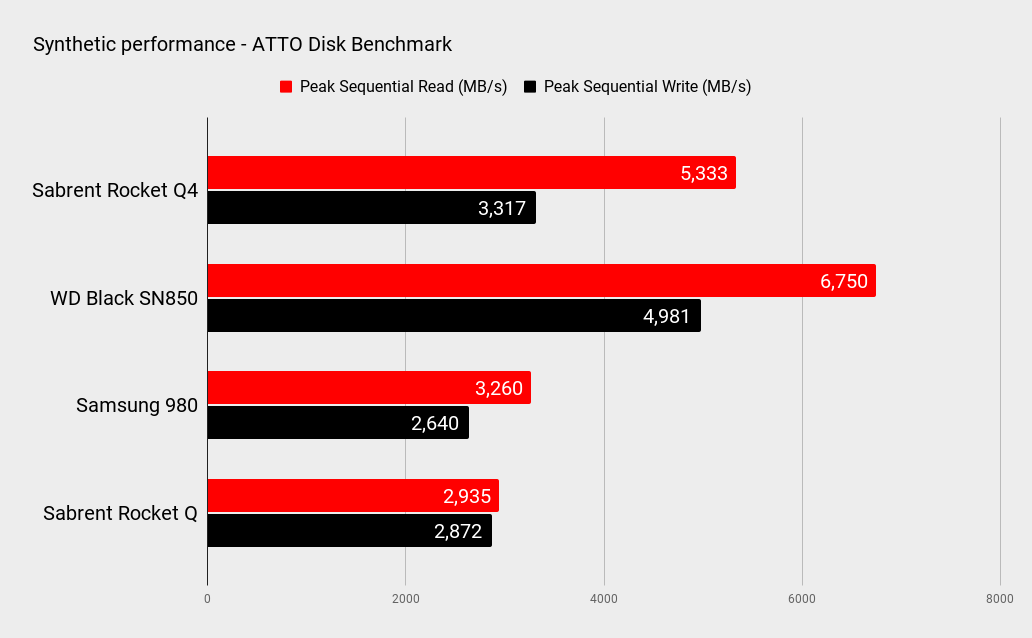
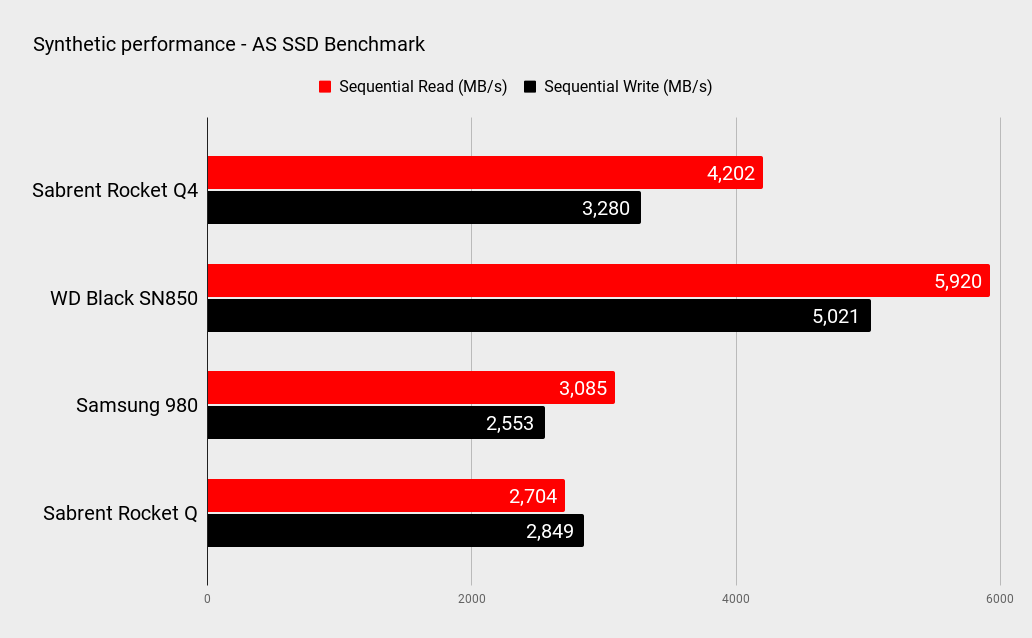
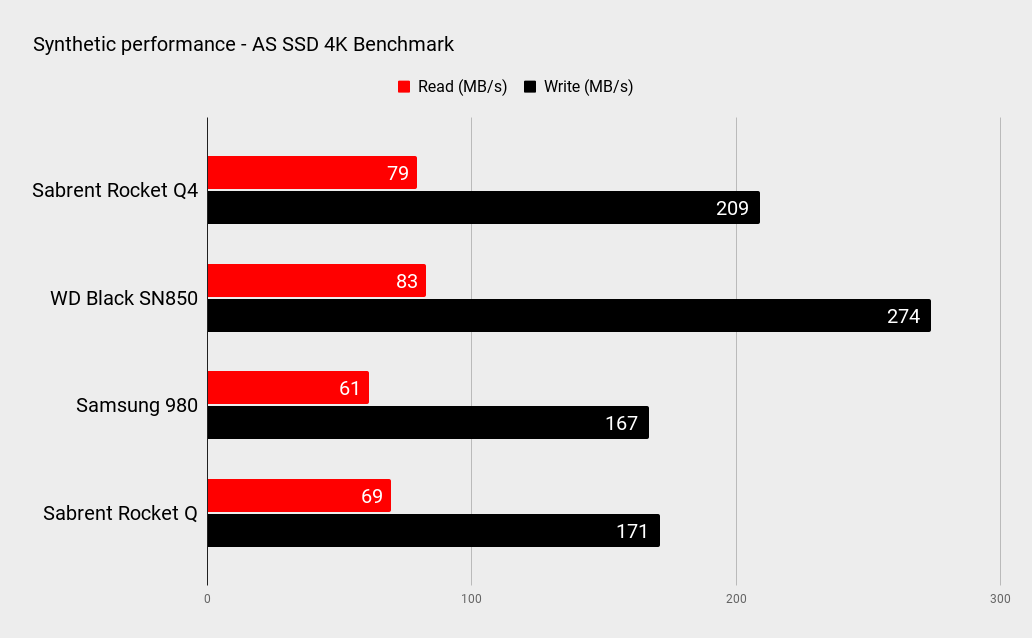
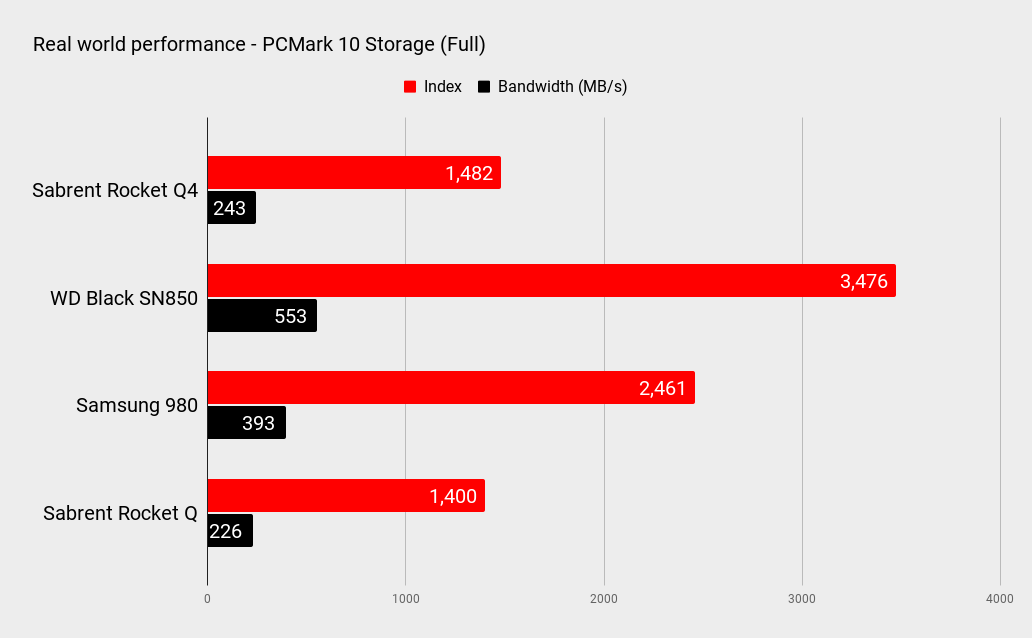
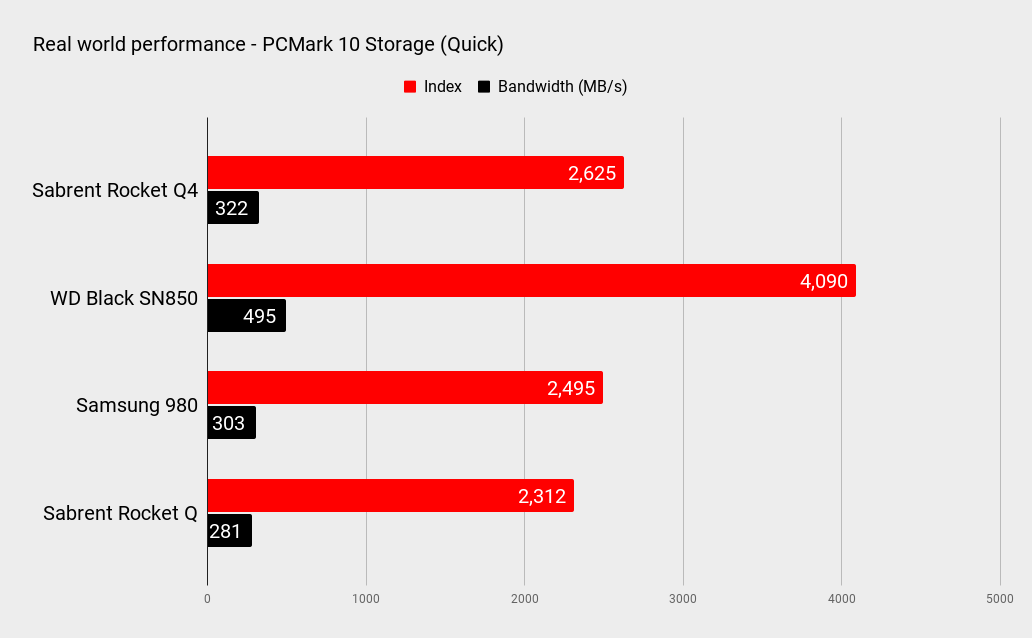
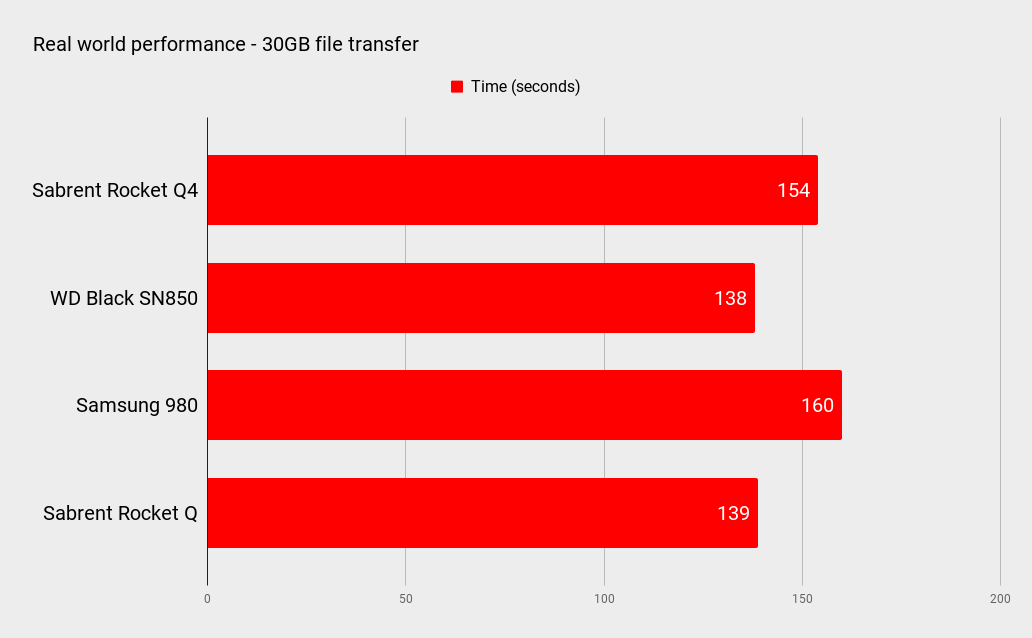
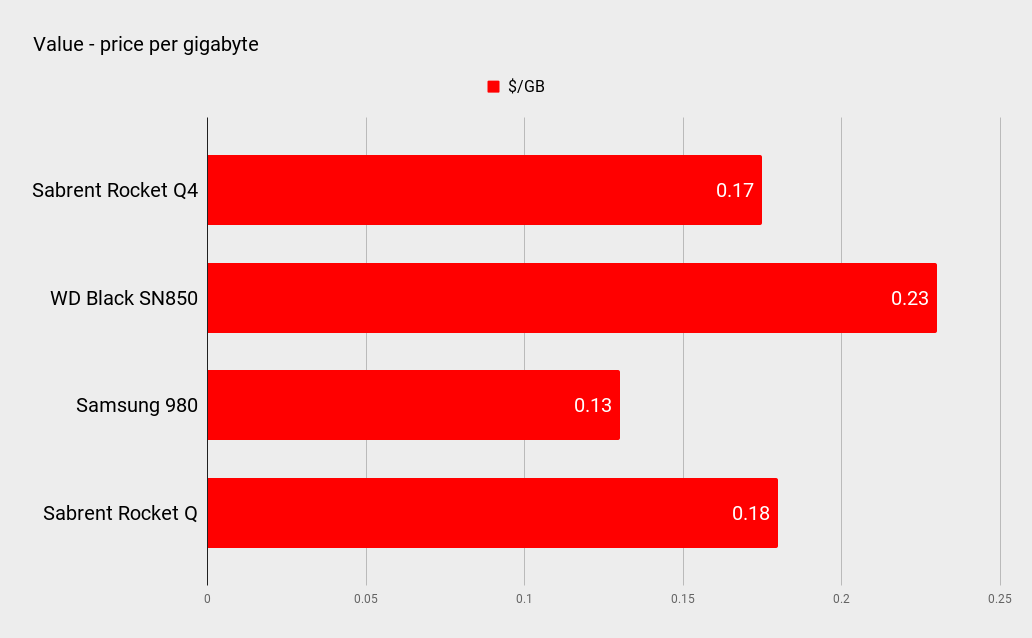
When it comes to synthetic performance, the Skyrocket Q4 is a number cancelled the pace of the first-gen PCIe 4.0 drives, which is to be supposed from a QLC-based SSD, merely ahead of the PCIe 3.0 drives. This Phison E16 control is capable of 4GB/s writes when paired with TLC storage, but here you're looking at more like 3.3GB/s, and that's the best-case scenario of sequential throughput.
The read performance is a better story, and in the synthetic tests at the least, this drive performs better than galore of the PCIe 3.0 SSDs. Even in the difficult 4K read and spell tests in the Eastern Samoa SSD benchmark, there's a clear upheaval in throughput compared to PCIe 3.0 drives.
It's in the real life performance that the write deficit of QLC flash shows itself most though, and copying the 30GB Steam game install takes 18 seconds thirster than the Sabrent Rocket 4. The PCMark10 full storage test backed this unimpressive indite execution, with the Rocket engine Q4 troubled to separate itself from like the Samsung 980, which is a PCIe 3.0 push.
It's the synoptic fib in Last Fantasize XIV, where the Sabrent drive puts in one of the slowest performances we've seen, taking over 12.5 seconds to load all five scenes. That's slower than most of the PCIe 3.0 drives we've seen, and even SATA drives offer the same kind of performance—this isn't really a repel you want to utilise for your main game storage.
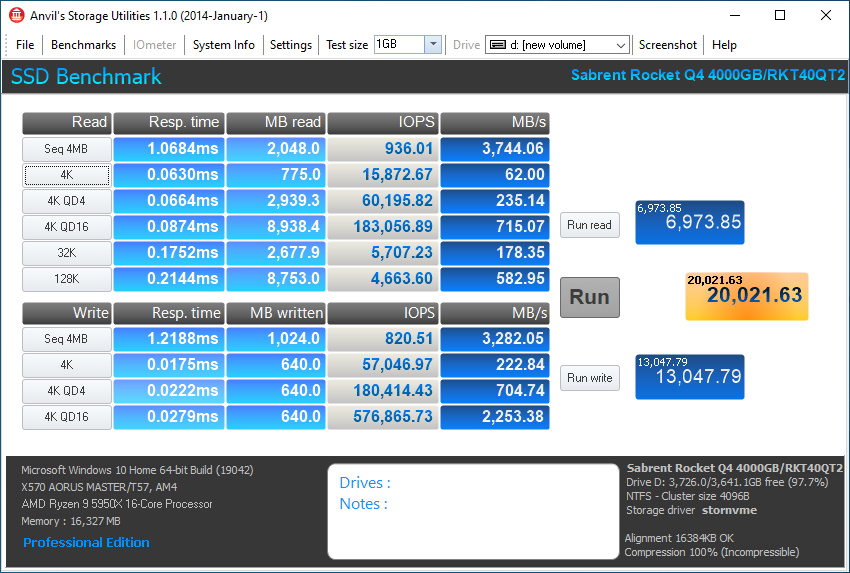
Piece the performance is somewhat off the pace and so, that doesn't put overmuch of a dent in the fact this is calm a fate of SSD for your money. In terms of price per gigabyte, this is the cheapest PCIe 4.0 drive you can buy rightmost now, trilled in as it does at $0.17 per GB.
It still represents a significant outlay at $699, so it's not exactly cheap. Better value PCIe 3.0 SSDs can be had for even less, but As the capacities advance, so does the monetary value.
Overall, the slightly sluggish writes (at least compared to other PCIe 4.0 drives) and humble real-existence execution holds this noncurrent from being a must buy. It still represents great value for money, and if you demand a lot of space, you'll do well to find any SSD that performs as well for the immediate payment. Alas, if you need a mint of severely fast place, you're departure to need to spend very much more than this.
Sabrent Rocket Q4 4TB
The Sabrent Rocket Q4 has the capacity to spare, but can't hit the execution high of the best PCIe 4.0 SSDs.
Source: https://www.pcgamer.com/sabrent-rocket-q4-4tb-review/
Posted by: hudsonthied1991.blogspot.com



0 Response to "Sabrent Rocket Q4 4TB review | PC Gamer - hudsonthied1991"
Post a Comment